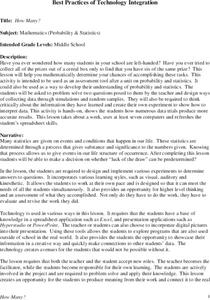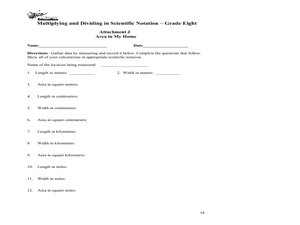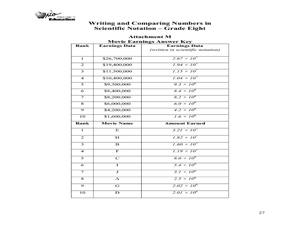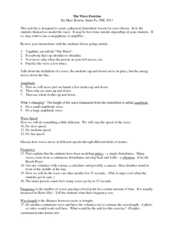Curated OER
Interpreting Graphs
Sixth graders interpret linear and nonlinear graphs. They create graphs based on a problem set. Next, they represent quantitive relationships on a graph and write a story related to graphing.
Curated OER
What is an Atlatl?
Let's go an an archaeological dig! Prepare your kids with a list of vocabulary terms relating to archaeology, including different types of items that one might find. They study pictures of each item and play a memory game based on the...
Curated OER
Introducing Maps Through Dance
Students are introduced to the key concepts of maps; direction, pathway/line, shape and symbol. They create the pathways and shapes they have "mapped" out on paper on the floor. They dance along the paths.
Curated OER
How Many?
Middle schoolers explore and design ways to collect data through simulations and random samples. They perform two experiments to determine the answers to various probability problems, and present the data/graphs in the form of a...
Curated OER
Disease Diagnosis
Students comprehend how biotechnology can be used to diagnose infectious disease such as protein technologies vs. DNA technologies. They comprehend procedure and uses of PCR, Western Blot, and ELISA as diagnostic tools. Students know how...
Curated OER
Math, Fractions, and Music
Students discover the relationship between musical rhythms and fractions. They add musical notes together to produce fractions and create addition and subtraction problems with musical notes. Students complete worksheets and create their...
Curated OER
The History of Life on Earth
Using meters as years, your class works together to map out the geologic time scale on a football field. Plenty of background information is included in this lesson plan as well as several resource links and a student worksheet. Your...
Curated OER
Saltwater: Nifty Aqueous Colorful Layers
A classic investigation on the density of liquids is explained for you in this lesson plan. Te begin, you prepare water samples of different salinities and then add different food coloring to keep them separated and easily identified....
Curated OER
Language Arts: Scavenger Word Hunt
Participate in a scavenger hunt to find objects beginning with a particular letter sound and take digital photos of them with your scholars. Using software, they find word pictures beginning with particular letters and locate picture...
Curated OER
Multiplication
Students practice their multiplication facts by reinforcement and repetition. Students write facts in their math journals, and use labeled soccer ball and deck of cards to practice multiplying by "number of the day." Play continues until...
Curated OER
See It, Say It, Move It, Do It!
Learn two new letters a week with this activity! After learning the two target letters, the class will make an alphabet video "performing" each letter. The letter's name, sound, and a motion associated with it will be included in the...
Ohio Department of Education
Multiplying and Dividing in Scientific Notation - Grade 8
Here is really nice set of resources on scientific notation. Eighth and ninth graders explore the concept of multiplying and dividing in scientific notation. In this multiplying and dividing numbers in scientific notation instructional...
Ohio Department of Education
Writing and Comparing Numbers in Scientific Notation-Grade Eight
Explore scientific notation in this mathematics lesson plan. Young mathematicians explore multiple representations of large number in scientific notation through the use of models, visual representation and expanded form. The lesson plan...
Curated OER
Compound Words
First graders discuss what compound words are and what they look like as a whole group. In this compound words lesson plan, learnerseach have a single word card and pair up with another student to create a compound word. A valuable,...
Curated OER
Yummy Gummy Subtraction
Here is a quick 15 minute lesson intended to introduce subtraction. Learners count and subtract gummy bears to complete 5 problems. The lessons suggest that the gummy bears can be saved and used the next day, but gummy bears get gross...
Curated OER
Things in a Line
Little learners recognize symbols, objects and how to depict numbers. For this matching lesson, they can match the number names with a set of items, model ordinal numbers, and complete a cute, cartoon-character worksheet.
Curated OER
Dot Plots
Number crunching statisticians explore displaying data with dot plots and define the difference between quantitative data and qualitative data. Dot plots are created based on a set of given data and analyzed.
Curated OER
Feeling the Heat
Pupils record temperatures at different locations around campus. They examine the results and draw conclusions about how materials and colors affect the amount of heat produced. They also analyze Los Angeles' temperature records over a...
Curated OER
Fact Or Opinion
Groups of junior highers find newspaper articles which contain both facts and opinions, and present examples of each to the class. The focus is on discerning between fact and opinion. Two excellent worksheets are embedded in the plan...
Curated OER
History of Ponce de Leon in Florida
Based in sound Educational Theory, this instructional activity uses art to convey the story of Ponce de Leon. Mild to moderately disabled students hear the story of the Fountain of Youth, examine a paining of Ponce de Leon, and act out a...
The Science Spot
The Wave Exercise
During a lesson on wave motion, physical science participants basically act out the waves as a group. Through their movements, the amplitude, speed, frequency, and wavelength are all identified. Ideas for modeling the reflection and...
Curated OER
The Call of the Wild: 4 Corners Activity
Readers of The Call of the Wild engage in a four- corners activity that fosters discussion and encourages readers to make connections between their lives and the text. Individuals respond to a series of discussion prompts and justify...
Curated OER
Using Rhythm to Teach Patterns and Directions
Introduce young learners to line dancing. Here are some simple movement patterns to teach them. First teach, repeat, and repeat again without music. Then when they have a pretty good grasp of the movement patterns, add music and practice...
Hawaiʻi State Department of Education
Symmetrical Objects
In order to better understand how to locate a plane of symmetry in 3-dimensional objects, learners create a dance. The class reviews dance and math symmetry, then they practice making symmetrical shapes and movements with a partner. They...
Other popular searches
- Kinesthetic Learner
- Kinesthetic Math
- Kinesthetic Learner Math
- Literacy Kinesthetic Learner
- Asian History Kinesthetic
- Kinesthetic Learner English
- Kinesthetic Lesson Plans
- Kinesthetic Punctuation
- Kinesthetic Intelligence
- Kinesthetic Math Games
- Kinesthetic Awareness
- Kinesthetic Learner Reading




